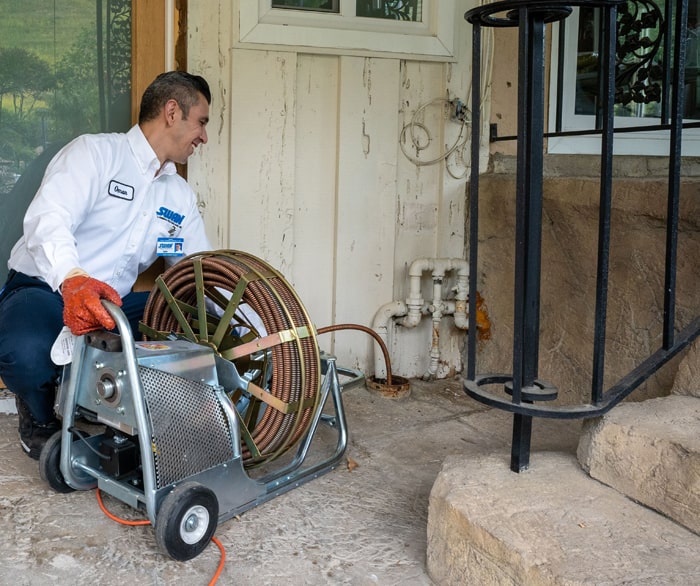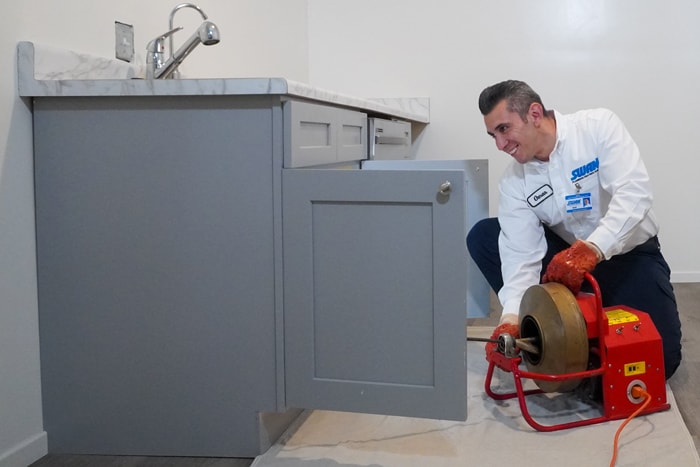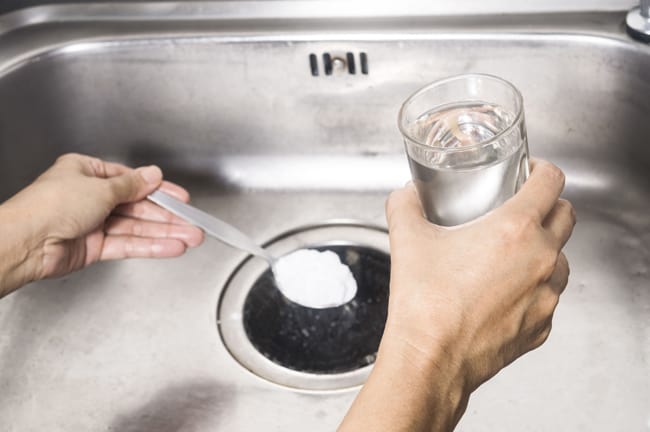
Even if you’re cautious about your drain and avoid common mistakes like pouring grease in your kitchen sink or flushing non-flushable products down the toilet, there’s still a chance you’ll experience a clog in one of your household drains.
Though it may not happen often, clogged drains are a major inconvenience and can lead to serious plumbing issues. If you have a clogged drain in your home, you want to solve the problem as quickly as possible, whether that’s a DIY method or hiring a professional plumber to clean it for you.
Still, you may have questions. Here are 7 common questions about drain cleaning from the pros at Swan Denver.
1. What Causes Drain Clogs?
In kitchen drains, grease is the main culprit. When you rinse grease into the drain, it solidifies and collects debris, leading to stubborn clogs. Bathroom drains are often clogged by soap residue, hair, and mineral build-up. In some cases, drains can become clogged by foreign objects, and with exterior drains, tree roots can infiltrate your sewer lines and cause blockages.
Understanding the cause of your clog is crucial for effective drain cleaning. While some issues can be resolved with simple DIY methods, others may require professional plumbing service.
2. Can I Use Chemical Drain Cleaners?
Chemical drain cleaners are a common go-to for many homeowners when faced with a clogged drain. While they’re usually effective in breaking down certain types of clogs, their use comes with some major downsides.
Most chemical drain cleaners are composed of harsh chemicals that can corrode pipes over time, especially if you use them frequently. They also pose health risks and are not environmentally friendly.
Instead of relying on chemical drain cleaners alone, consider alternative methods like using a plunger, auger, or mixture of baking soda and vinegar. These options are generally safer for your pipes and the environment.
3. Is Regular Drain Maintenance Necessary?
Preventative measures play a crucial role in minimizing the frequency of drain clogs. Regular drain maintenance is essential to keeping your plumbing system working as it should. This not only involves professional services but being mindful of what goes down the drains, avoiding excessive grease and food particles in the kitchen sink, and using drain guards in the bathroom to catch hair and soap scum.
Periodic drain cleaning using DIY methods like baking soda and vinegar or boiling water can help to prevent the buildup of debris in the pipes. Taking proactive steps can significantly reduce the need for more invasive drain cleaning measures.
4. How Can I Prevent Tree Roots from Clogging My Drains?
Planting trees away from sewer lines, installing root barriers, and scheduling regular inspections by a professional plumber like Swan Denver are effective preventative measures. Early detection of tree root intrusion allows for timely intervention, minimizing the potential damage to the plumbing system.
5. When Should I Seek Professional Drain Cleaning Services?
While some minor clogs can be addressed with DIY methods, there are times when professional drain cleaning services are necessary. If you find yourself dealing with persistent clogs, slow drains, or foul odors that won’t go away, it could indicate more serious issues lurking deeper in your plumbing system.

Professional plumbers have the equipment and expertise to identify and address complex drain issues. Hydro-jetting, a high-pressure water jetting method, is a common technique used by professionals to clear tough blockages and buildup. Seeking professional help when needed can prevent further damage to your plumbing system.
6. What Are the Benefits of Professional Drain Cleaning?
Professional drain cleaning offers several benefits beyond just unclogging drains. One significant advantage is the thorough removal of accumulated debris and buildup, promoting better drainage and preventing future clogs. Additionally, professional plumbers can identify potential issues during the cleaning process, allowing for early intervention and minimizing the risk of extensive damage.
Professional drain cleaning methods, such as hydro-jetting, are environmentally friendly and do not rely on harsh chemicals that can be detrimental to pipes. Regular professional drain cleaning can extend the lifespan of your plumbing system and save you money in the long run by reducing the need for costly repairs.
7. Can I Use DIY Methods to Unclog Drains?
DIY drain cleaning methods can be effective for minor clogs and routine maintenance. Simple tools like plungers and drain snakes are readily available and can help dislodge debris causing blockages. Baking soda and vinegar, when used together, can break down organic material, which hot water can flush away.

It’s important to proceed with caution, however, and avoid using harsh chemicals, excessive force, or sharp objects that can damage your pipes. If DIY methods aren’t effective or you have recurrent clogs, it’s best to consult with a professional plumber to assess the situation and provide a more comprehensive solution to get rid of clogs once and for all.
Risks of Clogged Drains
It may seem like a clogged drain is just a nuisance and proactive maintenance is intended to make your life easier, but there are plenty of risks with clogged drains.
Why should you address clogged drains quickly? Here are some risks to letting clogged drains go:
- Plumbing damage:When your drains are clogged, the pressure in the pipes increases because of restricted water flow. Increases in pressure can lead to burst pipes, causing a major disruption in your home, expensive repairs, emergency plumbing calls, and possible water damage.
- Foul odors:Clogs often come with water and waste materials that get trapped in your drain, leading to foul odors. These odors will make their way into your home, and even if you clear some of the clog, it may not take care of the odors. Professional drain cleaning may be the only option to restore a fresh smell.
- Slow drainage:Clogged drains can cause water to drain slowly, creating the ideal environment for bacteria and mold to grow. Standing water allows these dangerous microorganisms to thrive, leading to health risks for your family.
- Pests:Like microorganisms, pests are often attracted to water that stagnates in a clogged drain area. Flies, mosquitoes, and roaches look for water sources and moist, dark environments to survive. Some of these bugs are a pain, but others carry diseases that make your home unsafe.
- Expensive repairs:If you neglect your slow or clogged drain as just an annoyance, it won’t just go away on its own. Clogged drains will only worsen over time, potentially impacting the pipes and causing expensive plumbing problems down the road.
- Environmental impact:Clogged drains can cause overflow, releasing pollutants and contaminants into the environment. This not only affects your home but can impact local bodies of water.
Tips to Avoid Clogged Drains
- Be careful with food waste:When you’re cooking, make sure to dispose of grease, oil, and food particles properly. If you have a garbage disposal, avoid putting grease or hard foods like fibrous vegetables or animal bones into it. This is only designed for small particles. If you don’t have a garbage disposal, install a drain screen and make sure to dispose of grease by allowing it to cool and throwing it in the trash.
- Install drain screens:You should put drain screens in your sinks, tubs, and showers to capture food particles, hair, and other debris before they can clog your pipes. Empty your screens regularly to ensure they can capture all the stuff that shouldn’t go in your drain.
- Clean your drains:Implement a routine drain cleaning schedule using safe products. Regular maintenance will help your drains run clear and reduces buildup from soap scum, mineral deposits and other substances.
- Be careful with your drains:Good drain habits are your best defense against clogs. It’s important to educate your entire household about the materials that shouldn’t go in the drains or toilet, such as grease, paper towels, hygiene products, cotton swabs, and cotton balls.
- Manage tree roots:If you have outdoor drains, speak with your landscape and trim or remove trees and shrubs that have roots that can impact your drainage. This is a big project, but it’s an upfront effort that prevents a lot of hassle and expense in the future.
Keep Your Drains Flowing Clear
We hope these answers to common questions and tips for preventative drain maintenance help you understand the importance of regular drain cleaning. Taking care of your plumbing system’s health is an important part of maintaining your home and saving yourself a lot of money and stress in the process.
If you need professional drain cleaning, Swan Denver can help. Contact us to schedule your appointment!


